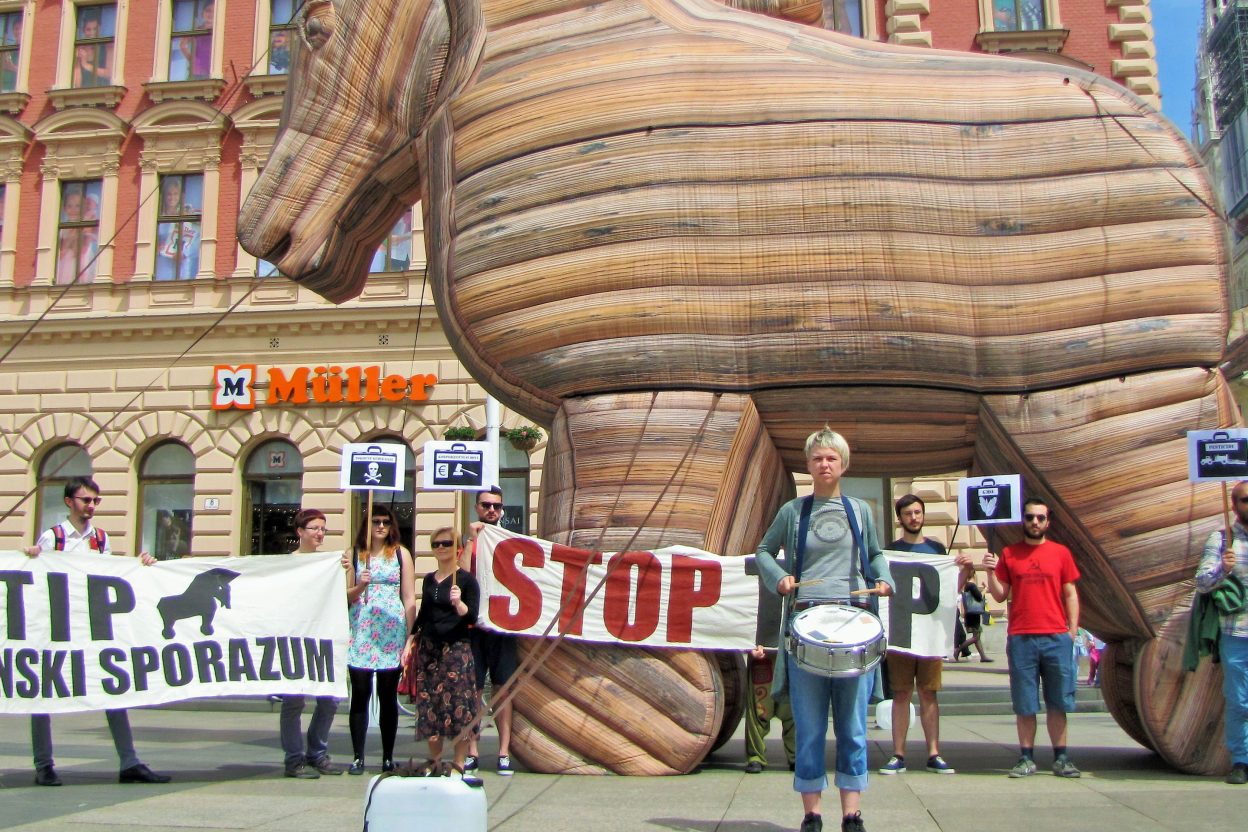The 8-metre tall Trojan horse was set on main square in Zagreb on the 6th of May by Zelena Akcija/Friends of the Earth Croatia , in cooperation with Baza za radničku inicijativu i demokratizaciju (BRID, Base for workers initiative and democratisation), GONG and the Stop TTIP initiative.
Young Friends of the Earth Europe were there to help raise awareness of the dangers of this Trojan horse treaty…
The organisers wanted to draw public attention to the ongoing negotiations about the Transatlantic Trade and Investment Partnership (TTIP) – the prospective trade deal between the European Union and the United States.
A Trojan horse treaty
The Trojan horse has been touring European cities since September last year as part of a tour organized by the Friends of the Earth Europe. Citizens were invited to sign a petition of a self-organised European Citizens’ Initiative (ECI) against TTIP and CETA – a similar trade agreement with Canada – and the action was joined by the collective Food Not Bombs and Family farm Didulica which were distributing free food to the citizens.
TTIP, which is the largest trade agreement in history, is being negotiated behind closed doors with little public involvement. Although it is trying to present itself as a tool to stimulate economic development and overcoming the financial crisis, this agreement contains many hidden dangers for our health, the environment, workers’ rights, and democracy itself, and in that sense is a modern Trojan horse. The secrecy in which the negotiations are taking place only supports this suspicion.
The agreement will allow multinational companies to sue the governments through private tribunals, far from the public eye, for introducing laws or changing policies that protect our health, the environment and our labour and democratic rights, if their assessment of these policies could reduce the expected profits.
Corporate courts
In other words, governments will be forced to pay compensation to companies for decisions taken in order to protect people and the environment.
The decision on whether the amendment of laws or policies has damaged the “right” of companies to profit would be made by three arbitrators, who often work for a private law firms and whose clients are large corporations.
The amount requested as a settlement in such cases is often in the order in billions of euros. Even if the government wins the case, it may be forced to pay million-dollar court costs. Among the better-known cases of the use of this type of “investor protection” is the current action of the Swedish energy giant Vattenfall against the German government because of the introduction of environmental standards that make energy derived from coal less profitable, as well as the decision to close nuclear power plants. Another example is the French company Veolia that sued Egypt for an increase in the minimum wage.
Weakening safeguards
In addition, there is a fear that the agreement will allow companies to use dangerous and environmentally harmful technologies such as genetically modified organisms (GMOs) or fracking.
The “precautionary principle”, which in Europe prevents trading products whose safety is not confirmed with a consensus in the scientific community, is in danger. This will have a negative impact on the safety of the food we eat and the air we breathe. As part of the negotiations, the pressure has been put on governments to privatie key public services such as health and water supply.
Lobby power
The Trojan agreement promotes big business on both sides of the Atlantic, giving them privileged access to decision makers. They are use this trade agreement as one of the levers for weakening regulations that protect people and the environment and represent an obstacle to even greater accumulation of capital. The European Commission remains committed to this agreement, regardless of the increasing public pressure and criticism from within the European Parliament. The Croatian government supports the agreement in principle although until now has not carried out the assessment of its effects on the Croatian economy and society.
Friends of the Earth Croatia, BRID, GONG and the Stop TTIP initiative are pushing for an economic system that is not harmful to people and the environment and are opposing the conclusion of the trade agreement which would weaken the protection of our environment, our labour and social rights and lead to the privatisation of our public services.

